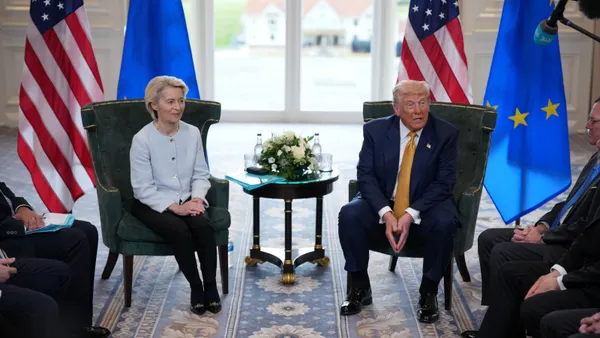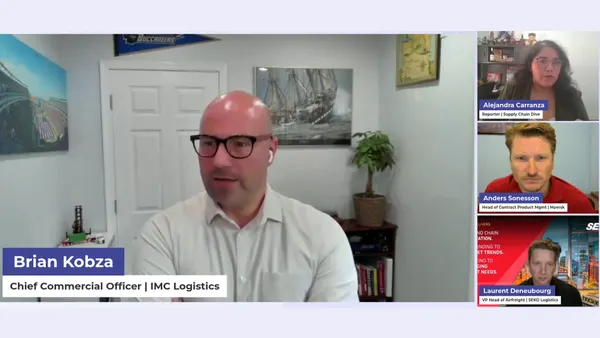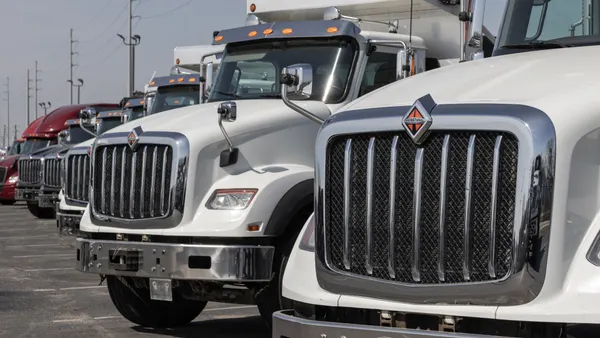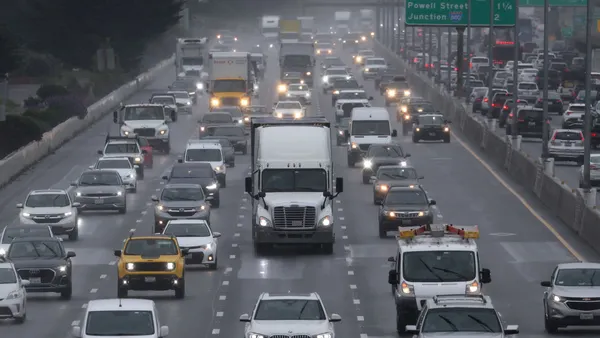Dive Brief:
- A national tax on vehicle-miles traveled would need to overcome several obstacles to be an effective means of funding infrastructure, according to an American Transportation Research Institute report published last week. The public would need to be convinced it is fair and that cheating will be punished, that it is not intrusive and that the privacy of the vehicle owner is assured, and that its costs would be "on par" with the existing system of collecting fuel taxes, ATRI said.
- Not long before ATRI released its report, the Owner-Operator Independent Drivers Association wrote to the Senate Committee on Finance, concerned the idea of a federal VMT was gaining steam. In a Feb. 24 letter to Congress, OOIDA blasted the idea of a truck-only VMT to make up for shortfalls in the Highway Trust Fund.
- The ATRI report and OOIDA's criticism come as President Joe Biden continues to formulate a reported $3 trillion infrastructure bill. Major issues in that formulation are how to offset the borrowing that will be needed to pay for the ambitious bill, and how to keep the Highway Trust Fund steady. The tax on fuel makes up a majority of the Highway Trust Fund's revenues, about $40 billion annually, according to ATRI.
Dive Insight:
U.S. infrastructure will require some new funding, even if Congress chooses to finance most of it through debt. With the federal fuel tax untouched since 1993, there is a push to pay for maintaining and adding roads and bridges with new taxes. The VMT is seen by proponents as a reasonable way to tax vehicles that increasingly use little or no gasoline or diesel, such as electric vehicles.
This month, Pete Buttigieg, secretary of the Department of Transportation, noted that interest rates were at record lows. Nevertheless, Congress has still indicated it wants a long-term funding fix to better fill the coffers of the Highway Trust Fund, which helps states repair roads, interstates and bridges.
Buttigieg is on record supporting a user-fee system, which he proposed in his plan. During his presidential run, he produced a plan that would raise $165 billion for the Highway Trust Fund, making it solvent through 2029. The plan suggested the VMT fee as the user fee, replacing the fuel tax.
The American Trucking Associations opposes the idea of a federal VMT fee on trucks, advocating instead to increase the fuel tax, which it says it will happily pay if the money goes toward fixing roads, bridges and congested interstates. The fuel tax also has an existing and cheap collection system that ATA has said is a fraction of toll systems.
Chris Spear, ATA president and CEO, told the group's National Accounting and Finance Council in June 2019 that tolling can eat up 35 cents of every revenue dollar taken in, while the fuel tax costs under 1 cent of each revenue dollar. Spear said just 5 more cents per gallon will raise $340 billion in four years.
But it's the idea of a truck-only VMT that arouses the special ire of the ATA and OOIDA. Spear said in February 2020 that such a tax will bring quick rebukes from his organization.
OOIDA told the Senate Finance Committee in its letter that the fuel-tax revenue from passenger cars, going into the Highway Trust Fund, will drop 11% from 2019 to 2029, while trucks are expected to increase their contribution in that time frame. Spencer said a truck-only VMT will wreck the entire infrastructure bill.
"We understand that because many elected officials lack the courage to raise necessary revenue through equitable increases to existing user fees, there is a strong interest in shifting all of the burden to our industry," Spencer said. "Truckers have always been willing to pay more into the system, but they refuse to be singled out."
The fuel tax stands at where President Bill Clinton last left it: 18.4 cents for a gallon of gasoline, and 24.4 cents for a gallon of diesel. ATRI's report said leaving the tax idle left inflation to eat away at its value. Inflation was more than 79% from 1993 to 2020, according to the report.
Inflation isn't the only problem. Fuel efficiency, especially in gasoline-powered vehicles, has dropped fuel-tax collections, ATRI reported. And drivers who use EVs pay no fuel tax.
A VMT fee is seen as a way to collect road-repair taxes from all users, including the anticipated growth in EV drivers. The VMT is currently being tested in two states, Oregon and Utah, and more states are considering the VMT tax.











